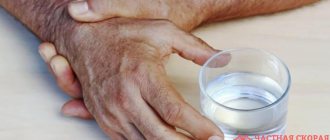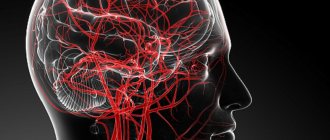Most often, tremor (shaking) of both hands is observed, but sometimes it happens that only one hand shakes, for example, the right one.
The most common cause of tremors in the right hand is considered to be physical activity, because most of us are used to working more with our right hand than our left. Particularly affected are those people whose work involves a constant and monotonous load on the right hand: this is conveyor production, high-precision work, and other professions. In this situation, the hand simply “gets used” to a constant load, and in the “no load” state, the muscles begin to involuntarily contract, and trembling occurs in the right hand. There is no pathology in this, there is simply muscle memory of tension.
Everything is rubbed. From a physical point of view, this is a very simple thing - it was discovered in electricity. Sticking amber to fur has been observed to attract dry leaves. Therefore, the name electricity comes from the name of Greek amber, explained the professor at the Faculty of Physics at Vilnius University.
Those who wanted to avoid these unpleasant sensations, the physicist jokingly and half seriously, advised wearing linen clothes. Because static electricity is created by the canvas onto something that disappears - into the body or other tissue. The more the canvas floats, the sooner it will be felt. Knowledge of these features is especially noticeable thanks to synthetics. Wool, even glass, also gets hot. Thus, static electricity can be generated in many objects around us.
Sometimes the right hand may shake due to impaired cerebral circulation on the right side of the hemisphere. Everyone knows that the main sign of a stroke is numbness in the arms and legs on the right or left side. So, in some cases, tremors in the right hand are in the nature of a residual phenomenon of such a right-sided stroke, more often than a microstroke. In this case, the hand may shake constantly, or only after nervous tension - as a result of stress and conflict situations.
According to the interlocutor, the load during this phenomenon can be quite large - it is not surprising that a person feels this. A few years ago, an Australian man was so upset that he lit the room on fire. Australian clothing is 40 thousand. Static electricity caused a discharge that burned the carpet in an Australian office and forced firefighters to evacuate everyone from the building.
Why do coffee shake hands?
On this day, the man wore woolen shirts and a synthetic nylon jacket. According to witnesses, the fire began to sound like a bombing. Initially, the true cause of the fire was not discovered, but when the man left the building, walked to his car and saw a piece of plastic that was melting on the floor, not humorous at all, he turned to specialists. For the first time, experts who encountered such a phenomenon said that his clothes could catch fire at any moment due to embarrassment.
Why is my left hand shaking?
The left hand may tremble with constant physical load on the hand, with incorrect distribution of such load on the upper limbs, with a sudden one-time load mainly on the left hand. In right-handed people, the left hand is obviously weaker than the right, so it is not adapted to a load greater than that offered to the right hand.
According to scientists, the process of creating static electricity is similar to lightning - when clouds rub together, there is a discharge among them if the air above the clouds is very dry. However, meteorologists, as said by the head of the climatology department of the Lithuanian Hydrometeorological Service Audrone Galvonaite, did not study the phenomena in which objects are collected. “I can only say from experience that the cold really warms you up with your clothes,” the source said.
According to some experts, this phenomenon may also be due to a higher difference in air temperature between the external and internal environments or to frosty weather both outdoors and in heated rooms. For example, when a synthetic sweater despairs of dry air, it begins to shiver and burn. Walking on synthetic carpet and touching a metal surface can also "shock" electricity.
Trembling in the left hand may occur from carrying heavy objects, after an unsuccessful sports training.
Why does my left hand shake if there was no physical stress on it as such? The most common cause of this phenomenon is considered to be incomplete pinched nerve, when the nerve processes extending from the spinal cord are pressed by nearby vertebrae or other factors: hernia, spasmodic nerve fibers, neoplasms, etc. Complete pinched nerve is usually accompanied by pain and sensory disturbances in the affected limb. Incomplete pinching can be manifested by innervation disorders: periodic numbness of the hand, tingling, transient tremor. Such symptoms are not constant, they either disappear or reappear. To confirm this diagnosis, you need to contact a vertebrologist.
However, doctors are relieved that these discharges, unlike electrical currents, are usually not dangerous. This is not electricity. We can say with confidence that this does not pose a threat to human health,” said Vanda Pamputienė, deputy director of the Vilnius Emergency Medical Service.
Up to 15% People feel disgusted when they see photos with holes or holes in the assembly, showing research into this disorder called trypophobia. They make me feel sick, make me cry, shake my whole body.
Why are my arms and legs shaking?
There are many known reasons why arms and legs shake at the same time. However, it is very important to establish that one true reason, because the future condition of a person, his comfort and health depend on it. Next, we describe the most common causes of this condition.
- Excessive physical overload, unusual stress on the body is the most common factor of tremor. Trembling in the limbs in this case is explained by muscle fatigue and is their response to overload. It is usually enough to give the muscles some time to rest and recover, and the tremors will go away.
- Emotional and mental shock - stress, conflict situation, worries, fear. Trembling in the limbs may be due to the body's defense against external irritants, as well as some features of the autonomic nervous system. In this case, sedatives and normalization of the nervous system will help eliminate tremors in the arms and legs. Relaxing massage, reflexology, swimming in the pool, SPA treatments are shown.
- Intoxication of the body caused by poisoning or toxic effects of chemicals or drugs. The most well-known type of intoxication is caused by the influence of alcohol - most people are familiar with alcohol tremors during a hangover. The cause of intoxication tremors in the arms and legs are toxic substances that affect the nervous system and brain. With systematic or constant intoxication, the effect also becomes constant, which affects the functioning of the vestibular system.
- Other pathologies that are the most serious and require mandatory consultation with a doctor and adequate treatment. Among these diseases, parkinsonism, hyperthyroidism and diabetes mellitus are more common.
Why do teenagers' hands shake?
In adults, hands may shake due to age-related changes, circulatory disorders, and bad habits.
Although trypophobia is called an “insurer,” the more scientists study it, the more they become convinced that it is not really a fear, and not just holes. This phobia is not recognized by the psychiatric community, and it is not a true phobia in the diagnostic sense. The researchers, which have not yet been published or reviewed by peer reviewers, say that a person with thief phobia looks at an outrageous image, increases their heart rate and activates the part of the brain responsible for vision.
They then raised the theory that this strange abomination may have biological roots that we have evolved as a result of fear of such derivatives because they are in nature's greatest danger. To investigate this effect and identify differences, the researchers analyzed photos found on trypophobia websites and images of holes that were not disgusting.
Most often, this condition is associated with an overly vulnerable nervous system of a young body, which can be explained by the numerous changes that occur in a teenager’s body during adolescence. Hormonal changes and “rebooting” of the nervous system lead to instability of mood, irritability, depression, increased fatigue and, as a result, trembling in the hands. This is usually considered temporary and goes away with age.
This is a blue-eyed octopus whose poisons are strong enough to kill even humans. To test their theory that these scary structures are dangerous, the researchers collected 10 photographs of the ten most toxic wildlife species. It is a blister venom that has liver and skin venom. These fish are the second most toxic vertebrates in the world.
Poisonous mushroom, as the name suggests, is also poisonous. Scientists analyzed their letters and found that these toxic animals sometimes have patterns that reflect trypophobia. Scientists believe that natural selection pressure to avoid patterns found in some toxic animals could develop into trypophobia.
The second possible reason why a teenager’s hands are shaking is that the nervous stress is too much for the still fragile nervous system. Studying, relationships with peers, lack of mutual understanding with parents and teachers, the desire for self-determination - all this leaves its mark on the young nervous system. There is no need to worry too much - with the end of adolescence, the trembling in your hands will pass.
Humorous disgust provides an evolutionary advantage, even if we don't consciously understand it: it encourages people to run away from an object with holes with trypophobia. “We believe that trypophobic tendencies are common to every person, although they may not be aware of it,” Cole said in a statement. "We found that people who didn't have this phobia looked at triphobic images were not as pleasant as other photos."
The researchers also studied photographs of trypophobia to better understand what causes the unpleasant reaction. They noticed that images showing trypophobia were characterized by certain features that differed from other natural images. The latter are often characterized by high contrast between large parts and small contrasting details.
Why does a person get annoying for no reason?
Annoyance and dissatisfaction, as a result of interaction, reveal the problem from the other side. Each personality needs adequate assessment from the environment. We are pleased to feel attention, respect, sympathy, compassion, mercy from friends.
But equal interaction does not happen every time. There are many egoists around who have never grown out of their sweet childhood. They are used to putting themselves in the center, attracting other people's attention. Remember how you demanded a toy, an answer, or praise from your parents. Were they interested in their adult questions back then?
Destructive people do not want to accept the burden of responsibility for their own destiny. It is better to place the blame on those around you. And relationships with such people are true torment.
Their behavioral characteristics irritate, exhaust, and weaken them. They penetrate the natural defenses of the mind into the very nature of the soul. They provoke anger, resentment, melancholy.
The most common techniques of energy theft:
- Depreciation. Girlfriends share their achievements. One perceives the other’s victories normally, asks for details, and praises. And the second one didn’t seem to hear anything. He immediately turns the conversation to himself. If the first insists on its own topic, then it tries to belittle the merits or significance of the achievement. Clear destruction. Although the techniques can be more insidious and invisible.
- Ignoring. The despot speaks exclusively about himself. The character trait is called narcissism. He is not interested in the problems of his friends. You subconsciously hope for an emotional response, but get ignored. Vampire technique makes you feel guilty. Well, they forced the “good guy” to deal with your “minor” issues. They pushed his “really important problems” to the back burner.
- Elevation. A friend, lover or acquaintance presents himself as a “teacher-patron”. It is he who knows better what is right, what will happen, what to think about, and what to reject. Timid objections provoke a rebuke. To insist means to cause hysteria, anger, criticism of your “lack of understanding.” The individual confronts the environment with the fact of the existence of only one significant person - his own. The rest are obliged to obey without complaint.
It is more correct to call the described types of interaction outright robbery, committed through the negligence of the victim. Even falling in love without reciprocity is theft. A destructive individual simply eats up your strength. Find the courage to stop the process. Give up the soul-destroying scenario.
Why do my hands shake and weakness?
If your hands are shaking and there is weakness throughout the body, you can also suspect many reasons. Most often, this condition is experienced by women and girls who adhere to a strict diet. General weakness, exhaustion of the body associated with a lack of nutrients, trembling hands - all these symptoms can be the result of a long and too limited diet. Eating unbalanced low-calorie foods and fasting at any opportunity affects the condition of the entire body. This problem can be solved by rationalizing nutrition, reviewing the composition and calorie content of dishes. The menu should be balanced with sufficient protein, fat and carbohydrates, vitamins and microelements.
With this knowledge, scientists were able to reduce the "tribophobia" of the video by reducing the contrast of the photo's details. Here are examples of corrected and uncorrected triphobic photos. Scientists say these visual cues may be partly responsible for the creepiness of the photo, although it may not be the only reason why someone finds it creepy. There are images with such visual, triphophobic features, but somehow they do not cause disgust.
One example is escalator stairs, which have unnatural spatial characteristics. By analyzing a large number of photographs associated with trypophobia, some of which depict not a large number of holes but a collection of other objects, we can conclude that holes are not the only cause of this disorder, the researchers write. "We don't think hacker fears accurately describe this breach."
The next reason for weakness and trembling in the hands is low blood pressure. Associated symptoms may include dizziness and headaches. You should not take measures to increase blood pressure without first measuring it. Only when you are sure that the reasons are low blood pressure, can you try to stabilize it. Drink strong tea, coffee, take a citramone tablet, lie down with your legs elevated.
It doesn't matter what you're really afraid of. The most important thing is that these photos are terrible. Her hospital diagnosed her with a dangerous cerebrovascular disorder that impaired her spatial orientation, her ability to see things clearly, and her ability to respond adequately to environmental factors, even though she could hear and understand everything.
Are all diseases caused by nerves?
The goal of the task is to perform simple actions that return perception. Ruta, who lives in Vilnius, began her history in the pre-war period. This was not something new or unexpected. However, the body apparently did not survive many years of repeated monotony. The physical and psychological pressure was enormous, and subsequent holidays and holidays did not provide much benefit. Finally, the experience began to change. Periodically, sudden dizziness occurred, which also suddenly disappeared.
Why do my hands constantly shake?
Most often, tremor is a transient phenomenon that disappears after the action of the causative factor ceases. But there are times when trembling in the hands does not go away for a long time. It is impossible to name just one reason why your hands are constantly shaking, since there are really many of them.
- Disorders of the vestibular and motor systems, possibly of a hereditary nature. Most often, with such disorders, trembling occurs not only in the hands, but also in some other parts of the body.
- Prolonged nervous experiences, a prolonged state of fear, tension, shock. This condition requires long-term therapy with tranquilizers, as well as consultation with a psychologist.
- Physical injuries, especially after major accidents: here shock combines with physical damage, which makes the situation worse.
- Professional activity that involves prolonged (over several years) load on the hands, as well as monotonous manual work, which forces one to constantly keep one’s hands tense.
- The initial stage of Parkinson's disease, diabetes mellitus or increased production of thyroid hormones. To check for these diseases, you need to see a doctor and undergo a series of laboratory tests.
- Chronic poisoning, prolonged exposure to toxic substances (due to professional activity, or as a result of living in an unfavorable environmental environment, or as a result of prolonged ingestion of toxic substances: alcohol, medications, etc.).
All of the above situations require mandatory consultation with a doctor. The doctor will conduct the necessary research and prescribe, depending on the cause, sedative, hormonal or detoxification therapy.
In addition, the skin was unexpectedly scratched. Sometimes the limbs felt a little bad. However, they didn't leave, so it was about 6 o'clock. After a while she felt nauseous, and this feeling became stronger and began to turn into a cold sweat. Finally, the landowners called an ambulance. Ruta recalls that although at that time she could barely react to the situation, she heard everything perfectly: how she measured her blood pressure, what number she said, even realized that it was high. She remembers it for the first time in the hospital.
Why do my hands shake and weakness?
When he installed the drop, after a few minutes Ruth began to clearly see the details of the ceiling, the room number. After some time, she fell into a floating state. In addition, the woman remembers how difficult it was to brush her teeth the first time. Another problem was getting a bed. I stumbled and put it on a daily basis. When the doctors arrived, they joked that I was probably in the army. But I had a goal to do simple actions that would return me to perception,” the interlocutor said.
Why do you feel bad after talking?
The body, without the participation of consciousness, is able to build a defense against a poisonous attack. The systems react in a complex way:
- the brain, having received the information, issues a command;
- nerve cells instantly distribute the signal throughout the organs;
- the circulatory system goes into defense mode (accelerates movement),
There is a noticeable tension in all members. The muscles feel this more clearly. That is, it is their reaction that manifests itself visually. Try spending half an hour in a state of extreme tension. You will feel completely exhausted, tired, overworked.
Shaking occurs due to muscle overstrain. They cannot withstand defensive measures. After all, the bodily shell is in contact with an obvious, deadly “enemy”. Although consciousness considers the person to be kind, friendly, friendly or neutral.
Feeling unwell occurs due to the use of all reserves. Getting through everyday life requires a certain amount of energy. Communication drew out what was due for the current day. The next portion will come only during sleep. Admit it, within a few minutes you were exhausted, as if you had unloaded a carriage by hand.
Why are your fingers shaking?
If trembling occurs in your fingers, it is recommended to consult one of the specialists: narcologist, neurologist, psychiatrist, toxicologist or therapist. It happens that it is quite difficult to determine exactly the reason why your fingers are shaking. Sometimes such trembling can indicate a serious illness, but in some cases it is a normal natural state of the body in response to some irritant.
The doctor suspected adrenaline was the culprit. At the hospital, after all the necessary tests, she was diagnosed with a cerebrovascular disorder, suspected of being emotionally exhausted. The vestibular apparatus is damaged, restored and oriented to the environment.
I had nothing to see - the gaze was so penetrating that everything floated, looking pale, lost in contour, like milk. When you move, your brain mobilizes and refreshes all your reflexes. On this side, a decrease in vascular permeability was noted. “Hopefully, the tomography showed that irreversible brain damage was avoided,” Ruta said. The woman does not drink alcohol at all, does not smoke, plays a lot of sports, so they are not afraid of their livelihood, they certainly will not kill.
Trembling in the fingers of a healthy person appears suddenly and just as suddenly and goes away without a trace. This condition can be provoked by sudden and strong physical activity, severe anxiety, prolonged depressive disorder, or hysteria. The best treatment in such a situation is rest, rest, and taking sedatives. You can drink warm tea with mint and lie down in a calm environment. In more severe cases, strong tranquilizers and anticonvulsants may be required.
Tremor as a side effect of adolescence
However, due to her highly active brain, the doctor suspected her that the cause of her illness was the hormone adrenaline, which also damaged the blood vessels.
My life is really very adrenaline-filled. My financial capabilities allow me to live this way. On weekends there is also no work, no telephone conversations, no computer, no watching TV, just reading books. This led me to transform the routine of the doctor who said that neither reading books or climbing mountains or other active activities that are enjoyable for me do not rest my brain. They are only happy when they can do something slowly, without any hesitation,” the source said. She also began attending psychotherapy, which helps deal with shock and self-esteem. According to the woman, in this situation it is very easy to go to extremes.
A common cause of trembling fingers is a side effect of any medications. If you are taking any medications and you experience tremors in your fingers, contact your doctor: he should stop or replace the medication and carry out symptomatic therapy.
Anxiety disorder - symptoms and treatment
- Generalized anxiety disorder
Generalized TD is a common disorder characterized by long-term anxiety that is not focused on any one object or situation.
People suffering from generalized TD experience nonspecific, persistent fear and become overly anxious about everyday activities. Generalized TR is “characterized by chronic excessive worry, accompanied by the following symptoms (at least three of the following are required to make the diagnosis): restlessness, fatigue, difficulty concentrating, irritability, muscle tension, and sleep disturbances.”[6]
Generalized TD is the most common anxiety disorder among older adults.[7] Anxiety can be a symptom of another medical condition or occur in association with substance abuse problems, which should be considered by the physician during diagnosis. The person may have trouble making daily decisions and remembering commitments due to lack of concentration/concern.[9] Externally, the patient looks tense, there is increased sweating of the hands, feet and armpits.[10] The person may be tearful, which indicates depression.[11] Before diagnosing an anxiety disorder, a physician must rule out drug anxiety and other medical causes.[12]
In children, this type of anxiety disorder may be associated with headaches, restlessness, stomach pain and palpitations. It usually begins between the ages of 8 and 9 years.[13]
- Phobic disorders
The single largest category of anxiety disorders is phobias, which include all cases where fear and anxiety are caused by a specific stimulus or situation. Between 5% and 12% of the population worldwide suffers from phobic disorders.[8] Patients typically anticipate terrifying consequences from encountering the object of their fear, which can be anything from an animal to a public place. Common phobias: air travel, blood, water, driving, tunnels. When people are exposed to a phobia, they may experience trembling, shortness of breath, or rapid heart rate.[14] People understand that their fear is not proportional to the actual danger, but still they cannot overcome it.[15]
- Panic disorder
In panic disorder, a person experiences brief episodes of intense fear and anxiety, often marked by trembling, confusion, dizziness, nausea, and/or difficulty breathing. Defined as fear or discomfort that occurs suddenly and reaches a peak in less than ten minutes, these panic attacks can last several hours.[16] Attacks can be caused by stress, irrational thoughts, general fear, or fear of the unknown. However, sometimes the trigger is unclear and therefore attacks can occur without warning. To prevent an attack, you must avoid the trigger. However, not all attacks can be prevented.
In addition to recurrent, unexpected panic attacks, a diagnosis of panic disorder requires that said attacks have chronic effects: either anxiety about the potential consequences of the attacks, persistent fear of future attacks, or significant changes in behavior associated with the attacks. Often, normal changes in the heartbeat noticed by patients make them think that something is wrong with their heart, and they may have another repeat panic attack.
- Agoraphobia
Agoraphobia is the fear of crowded places and open spaces. It is closely related to panic disorder and is often caused by the fear of having a panic attack. Manifested by the need to find a door or other escape route in a constant field of view. In addition to the fears themselves, the term agoraphobia is often used to refer to avoidance behaviors that often develop in patients with panic disorder.[18] For example, after a panic attack while driving, a person with agoraphobia may develop anxiety about driving and therefore avoid driving. This avoidance behavior can often have serious consequences and increase fear.
- Social anxiety disorder
Social TD (also known as social phobia) describes an intense fear and avoidance of negative social control, feelings of embarrassment, humiliation, or social interaction. This fear may occur in specific social situations (such as public speaking) or generally in most (or all) social interactions. Social anxiety often manifests itself with specific physical symptoms, including flushing, sweating, and difficulty speaking. As with all phobic disorders, those people who suffer from social anxiety will often try to avoid the source of the anxiety. In the case of social anxiety, this is especially problematic, and in severe cases can lead to complete social isolation.
- Post-traumatic stress disorder
Post-traumatic stress disorder (PTSD) was previously classified as an anxiety disorder (now, according to the foreign classification of mental disorders, PTSD has moved to traumatic and stressor-related disorders). It is the result of a traumatic experience. PTSD can be the result of an extreme situation such as combat, natural disaster, rape, hostage situations, child abuse, bullying, or even a serious accident. Anxiety disorder can also result from long-term (chronic) exposure to severe stress (for example, soldiers who endure individual battles but cannot cope with continuous combat).[19] People may experience sleep disturbances.[20] There are a number of treatments that form the basis of an anxiety treatment plan for those suffering from PTSD. Such treatments include cognitive behavioral therapy, psychotherapy, and support from family and friends.[8]
Research on PTSD began with Vietnam veterans as well as victims of natural disasters. These studies found that exposure to a natural disaster was the best predictor of PTSD.[21]
- Emotional disorders whose onset is specific to childhood
This type of AD involves feeling an excessive and inappropriate level of anxiety about being separated from another person or place. Anxiety disorders affect approximately 4% of children and 7% of adults, but they typically experienced severe psychological situations in childhood. In some cases, even a short separation can cause panic.[22][23] Treating your child early in the disorder can prevent further problems. Therapy includes teaching parents and families how to deal with this type of TD. Often parents increase anxiety because they do not know how to properly work with their child. In addition to parenting training and family therapy, medications such as SSRIs may be used to treat anxiety.[23]
- Situational anxiety
Situational anxiety occurs in connection with new situations or changing events. It can also be caused by various events that cause a person some discomfort. This type of TR is quite common. Most often, in specific situations, a person will experience panic attacks or high anxiety. A situation that makes one person feel anxious may not affect another person at all. For example, some people become anxious in crowds or small spaces, so being in a densely packed vehicle or store can cause them extreme anxiety and possibly a panic attack.[24] Others may experience anxiety when major life changes occur, etc.
- Obsessive-compulsive disorder
Obsessive-compulsive disorder (OCD), like post-traumatic stress disorder, was previously classified as an anxiety disorder according to the foreign classification of mental disorders. OCD is a condition in which a person experiences obsessions (anxious, persistent, and intrusive thoughts or images) and/or compulsions (urges to repeatedly perform certain actions or rituals) that are not caused by drugs or physical influences. This condition causes anxiety or social dysfunction.[25][26] Compulsive rituals are personal, individual rules that should be followed in order to relieve anxiety.[26] OCD affects approximately 1-2% of adults (more women than men) and less than 3% of children and adolescents.[25][26]
A person with OCD knows that the symptoms are unreasonable and therefore struggles with both thoughts and behavior.[25][27] Symptoms may be associated with external events that cause fear (imagining a house burning when thinking about what the person has forgotten turn off the iron) or worry about misbehavior.[27]
Behavioral, cognitive, genetic, and neurobiological factors may be involved in OCD.[26] Risk factors include family history, loneliness (although this can result from the disorder), higher socioeconomic class, or lack of paid employment.[26] About 20% of people with OCD will overcome the disorder and its symptoms with at least decrease over time in most people (another 50%).[25]
- Selective mutism
Selective mutism is a disorder in which a person who is able to speak does not speak in certain situations or when exposed to certain people. Selective mutism typically coexists with shyness and social anxiety.[28] People with selective mutism remain silent even when the consequences of their silence include shame, social ostracism (expulsion), or even punishment.[29] Selective mutism affects about 0.8% of people at some point in their lives.[2]
Why are your hands and head shaking?
We have already looked at many reasons why your hands may shake. But sometimes hand tremor is accompanied by trembling in other parts of the body. For example, why do my hands and head shake? Of course, physical activity and anxiety cannot be considered the cause of this phenomenon.
Simultaneous tremors in the limbs and head may indicate disorders in the central nervous system, which requires urgent and mandatory consultation with a doctor. This problem most often appears in old age, when patients begin to notice that their fingers begin to make uncontrolled movements. Unfortunately, in most cases this can mean the development of Parkinson's disease, a chronic degenerative disease of the nervous system in which the patient loses control of his movements. The second name for this disease is shaking paralysis: a person experiences tremors of the limbs and head, and the patient is unable to cope with this condition.
Sometimes trembling in the hands and head in older people is not associated with Parkinson’s pathology, but means instability of the central nervous system, when a person begins to get unreasonably nervous and look for a comfortable position. He becomes irritable and his body trembles. Such symptoms usually go away when the patient falls asleep. And the next morning the condition may resume.
Without a doubt, hands and heads also shake in people who abuse alcoholic beverages due to constant intoxication and brain damage. In such cases, not only your hands and head may shake, but also your tongue and facial muscles. Thus, the body asks for help, indicating pronounced signs of intoxication.
Why do my hands shake so much?
It's no secret that hand tremors, especially strong ones, cause a lot of discomfort to people. It becomes difficult for them not only to write, eat and do housework: this disorder causes many problems in society, the person begins to develop complexes, hide his hands, and avoid company. But, fortunately, trembling in the hands is not always a manifestation of disease.
Sometimes this indicates low levels of glucose in the bloodstream. This condition is not uncommon if a person is hungry or has deprived himself of carbohydrate nutrition for a long time (for example, followed an exclusively protein or low-carbohydrate diet). Other symptoms of this condition are fatigue and depressed mood. In this case, stabilizing the sugar level will help: you need to eat something carbohydrate, for example, chocolate, banana, dried fruit. It would be useful to consult an endocrinologist who will check your metabolic processes.
Severe hand tremors can be observed in people who drink large quantities of coffee and other caffeine-containing drinks (energy drinks, cola). As you know, caffeine stimulates excitation processes in the body, which can cause quite severe tremors in the hands.
The most common cause of trembling hands is increased production of adrenaline, which happens during quarrels, fear or shock. Slowly increasing tremors can be caused by drinking alcohol or smoking (especially when a person is trying to abruptly give up bad habits). In some cases, the reason why hands shake may be vegetative-vascular dystonia, a disease that more often affects young girls and women. One way or another, only a specialist can determine the exact cause of this condition based on certain studies.
Not only with anxiety from birth, from childhood, after drinking, binge drinking or stress, but also in old age and stress, a similar problem appears. It also happens that the situation worsens after boxing, when straining, doing push-ups, when writing, and even in church. All possible manifestations of the problem are considered and how to deal with it is told.
The proposed solutions can be taken into account by anyone who has a desire to solve existing health difficulties and understand why this happens and how to eliminate unpleasant symptoms.
Why do men's hands shake?
It is generally accepted that hand trembling in men is a sign of alcoholism. This opinion is not always true. Hand trembling, scientifically called tremor. can be periodically observed in every healthy person. Fear, nervous shock, strong excitement, physical stress, cold are factors that cause tremor. After eliminating the irritant, everything returns to normal.
Why do a man's hands tremble when he sees a woman?
The trembling of a man’s hands at the sight of a woman indicates the arrival of spring and the subject’s excessively reverent attitude towards ladies. Much to the regret of the fair half of humanity, the observed phenomenon disappears after several days of living together. To be serious, this phenomenon is associated with excessive excitement experienced by a man at the sight of a woman he likes. You can combat trembling hands by mastering relaxation techniques and reducing caffeine and nicotine intake to a minimum.
Why do your hands tremble during physical activity, after training, and why do your legs tremble on the uneven bars or horizontal bar?
Trembling of the limbs after intense physical activity is a natural reaction of the body caused by overexertion or muscle fatigue. If trembling occurs constantly after physical exercise or it takes a long time to subside, be sure to consult a specialist.
Why do your hands shake when you want to eat, when you are hungry?
Most often, this condition is associated with low blood sugar, but it can also be a sign of other serious diseases. In general, the answer to this question should be sought not on the Internet, but at a doctor’s appointment.
Why do my hands shake when bench pressing?
One of the reasons why your hands shake when bench pressing is when you try to lift too much weight. Try reducing the weight of the barbell. It is also possible that you are not approaching this exercise quite correctly. Try changing your grip. Sometimes the same problem is associated with vitamin deficiency and a lack of microelements. Here only a specialist can give advice and prescribe a course of treatment.
Why do hands shake in old age in older people?
Hand tremors in old age may be caused by Parkinson's disease. The disease is incurable, but the symptoms themselves can be significantly reduced by taking medications. Sometimes trembling in the hands occurs against the background of other diseases - with damage to the kidneys, liver or dysfunction of the thyroid gland. Adequate treatment after a comprehensive examination should also be prescribed by a specialist.
What to do if your hands are shaking, how to treat it, treatment with folk remedies
If your hands begin to tremble when you feel nervous, then soothing tea made from motherwort or valerian herbs (1 tablespoon of herb per glass of water) will help calm the tremors. Divide the brewed tea into 3 doses during the day. If tremors are caused due to problems with the thyroid gland, then you need to introduce egg yolk or seaweed into your diet. Linden tea will help reduce hand tremors when suffering from diabetes. As can be seen from the examples, there is no single cure for shaking hands, so before self-medicating, you should find out the root cause of this condition.
Why do pregnant women's hands shake during pregnancy?
There are many reasons that cause the symptom of trembling in the hands of a pregnant woman. Often this unpleasant phenomenon is associated with hormonal changes in the body and is not a pathology. However, an exact answer to this question can only be obtained from the attending physician.
Why do my hands tremble from alcohol after a hangover or over-drinking in the morning?
Trembling in the hands from alcohol or during a morning hangover is the first signal that you need to get rid of this bad habit; the body begins to malfunction. Treatment of the disease and measures to relieve its symptoms are prescribed by the doctor after the patient undergoes a comprehensive examination.
Why do coffee shake hands?
After a cup of coffee, your hands shake because the caffeine contained in the drink has a stimulating effect on the nervous system. Also, trembling in the hands can signal hypertension and vegetative-vascular dystonia. In any case, coffee consumption should be reduced and, if possible, eliminated from your diet.
Why are your hands shaking and your head feeling dizzy?
The reasons that cause trembling in the hands and dizziness in the head can be very different - from vegetative-vascular dystonia to intoxication of the body. Therefore, it is better not to self-medicate, but to seek help from a doctor.
Why do your hands shake when you play the piano on stage?
Fear of stage performance is a natural phenomenon, inherent even in seasoned actors and performers. Nevertheless, they manage to take control of their emotions and convey to the audience the main idea because of which the artist actually appeared on this stage. This is how the famous theater and film actor Oleg Basilashvili overcame anxiety and shyness in his time. He put a huge beret on his head, stuck a feather in it, and paraded around like this in the most crowded places, trying not to notice or react to the reactions of others. Try and take your first step towards getting rid of far-fetched fears. If it doesn’t work, put on a bandana and go ahead...
Why do the hands of a young girl, a young man, a teenager, young people shake?
If a young girl or guy’s hands tremble and the factor of excitement is excluded, then this is a sign of some kind of disease. Trembling in the hands at a young age can be caused by: - a malfunction of the thyroid gland; — multiple sclerosis; - pathology of the area of the brain responsible for coordination of movements; - heart defects; - bad habits - drug addiction, alcoholism, smoking and a number of other reasons.
Why does it start to shake when you meet your ex or ex?
On the other hand, experiencing and living one relationship and entering into completely different ones, people may notice that something happens to them at the moment when they literally “meet the past.” Why can men or women “shake” when meeting their exes?
The answer to this question depends on many factors and the situation in which people once separated:
- The breakup was painful. That is why one or two people meeting may feel the fear that they will again experience the feelings that once upset them. It is quite natural to feel such fear, because every person has a natural instinct of self-preservation (the ability to avoid dangerous and harmful things).
- The breakup was painful for one. In such a situation, it is the one who was once “abandoned” who will be the “coward”. The other half at this time can feel completely calm and confident.
- During the breakup, someone offended someone . We are talking about moral humiliation or betrayal. This could cause a big blow to the nervous system of the abandoned person one day, therefore he will experience stress constantly, but it will intensify when he meets his “ex.”
- The breakup did not affect love . This can happen to one person or two. Perhaps the breakup was accidental and stupid, the relationship collapsed, while the feelings remained alive. After a while, when people meet, they can experience excitement similar to the experiences they felt when falling in love.











